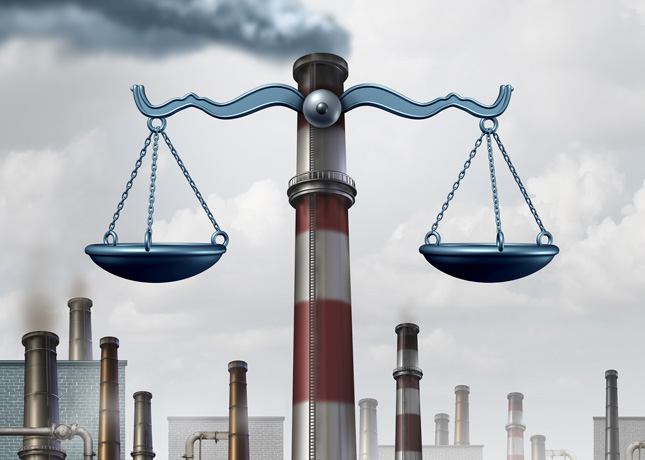-
The People vs. Pollution: Empowering NGOs to Combat Pollution with Environmental Law
August 23, 2018 By Zhuoshi Liu
China is four years into its war on pollution, and while the skies over many of its cities are bluer and thousands of polluting industries have been closed, many challenges remain. According to China’s Ministry of Ecology and Environment, 16 percent of China’s soil is polluted, 239 of China’s 338 biggest cities failed to meet air quality standards in 2017, and 32 percent of China’s surface water is not clean enough to swim in. To confront these challenges, Chinese citizens and nongovernmental organizations (NGOs) are taking legal action to halt polluters, push local government to be more accountable, and strengthen enforcement of pollution laws—but most lack the legal experience and expertise needed to be successful. A series of workshops held by the Environmental Law Institute earlier this year sought to close this gap by training NGOs and legal professionals in China on best practices for environmental public interest litigation.
NIMBY Protests Expand, But Don’t Always Succeed
In the past few years, these dire pollution problems have sparked citizen action: Affluent urbanites in Beijing and Shanghai expressed their anger over health-threatening smog by attaching masks to public statues; suburban street protests temporarily halted chemical plant construction; and rural villagers cleaned up rivers full of trash. And some protests have led to longer-term resolutions, such as the cancellation of a paper manufacturer’s plans to build a discharge facility near Shanghai in 2012.
These NIMBY protests can, however, just shift pollution elsewhere; for example, a chemical facility that was forced to relocate to the western province of Qinghai polluted the groundwater so severely that cattle died within two hours of drinking local well water. Poor provinces in western China have lowered environmental protection requirements to attract investors, and as regulations in eastern China become more stringent, companies pushed out by NIMBY protests have moved west.
New Tools for a New Arena: NGOs Enter the Legal Fray
Chinese citizens can sue polluters for damages, and for more than 20 years, Chinese NGOs, such as the Center for Legal Assistance to Pollution Victims, have helped citizens file individual or class action cases. While courts have accepted many non-class and non-public interest environment cases, class action cases are still relatively politically sensitive, so many Chinese courts are reluctant to accept them. In 2015, the Chinese national legislature amended the Environmental Protection Law to authorize eligible NGOs to file public interest lawsuits to halt pollution before damage to ecological or human health.
These measures have allowed Chinese NGOs to enter a new arena in the litigation battles against polluters; from 2015-17, the number of environmental lawsuits filed by NGOs jumped from 8 to a whopping 112 cases per year. However, while more than 700 NGOs are eligible to file environmental public interest cases, only about 25 have done so. A vast majority of the eligible NGOs do not have legal expertise. More experienced NGOs could have avoided failed cases by designing better litigation strategies. Chinese NGOs need training on environmental law and experience with environmental litigation to more effectively bring public interest cases to court.
Environmental Public Interest Litigation Boot Camp
To train Chinese NGOs and legal professionals in the art of environmental public interest litigation, my colleagues and I at the Environmental Law Institute (ELI) conducted capacity-building workshops in China from January to May 2018. ELI partnered with the China Environmental Protection Foundation (CEPF), a major Chinese NGO active in environmental public interest litigation, to train 265 participants from 26 provinces, including representatives from 51 NGOs, as well as judges and prosecutors.
The workshops addressed typical processes and major legal issues in environmental citizen suits and illustrated best practices in designing litigation strategies. Organizers also covered issues such as collecting evidence, dealing with scientific uncertainty, using citizen science, structuring remedies, and conducting negotiations, as well as how citizen lawsuits in the United States have helped promote a culture of compliance among businesses.
The workshops identified the main challenges faced by Chinese NGOs, legal professionals, and defendants, such as the difficulty of finding potential cases. Pointing to several successful cases in which prosecutors and NGOs cooperated, experts from the Supreme People’s Procuratorate encouraged prosecutors to work with NGOs to find potential cases, collect evidence, and structure the remedies. Since a number of Chinese NGOs reported struggling to collect technical evidence, Jeff Gracer of Sive Paget & Riesel described how U.S. NGOs like the Natural Resources Defense Council use publicly available monitoring information from the U.S. National Pollutant Discharge Elimination System to identify violations by oil companies. Chinese NGOs could use information from China’s Pollutant Discharge Permit System as evidence in court, instead of paying laboratories for expensive testing services.
The workshops helped prepare Chinese NGOs to effectively participate in environmental civil litigation; 80 percent of the participants reported in a survey that they will apply the lessons learned within six months. And only a few weeks after they participated in the workshops, a Beijing-based environmental group focusing on wetland protection filed their first public interest case. Judge Han Deqiang of the Supreme Peoeple’s Counsel said these workshops are tremendously helpful for building the capacities of NGOs and other environmental organizations. Future workshops will seek to reach even more NGOs and lawyers, particularly those focused on using citizen science data and designing innovative environmental remedies.
Liu Zhuoshi is a Staff Attorney with the China Program at the Environmental Law Institute. Liu’s projects focus on capacity building for public interest groups and participation in public interest environmental litigation in China.
Sources: Asia Environmental Governance Blog, Center for Legal Assistance to Pollution Victims, China Dialogue, China Environmental Protection Foundation, Chinese Ministry of Agriculture, Chinese Ministry of Ecology and Environment, Economist, New York Times, People’s Daily, Scientific American
Photo via Shutterstock/Lightspring. All rights reserved.
 A Publication of the Stimson Center.
A Publication of the Stimson Center.



